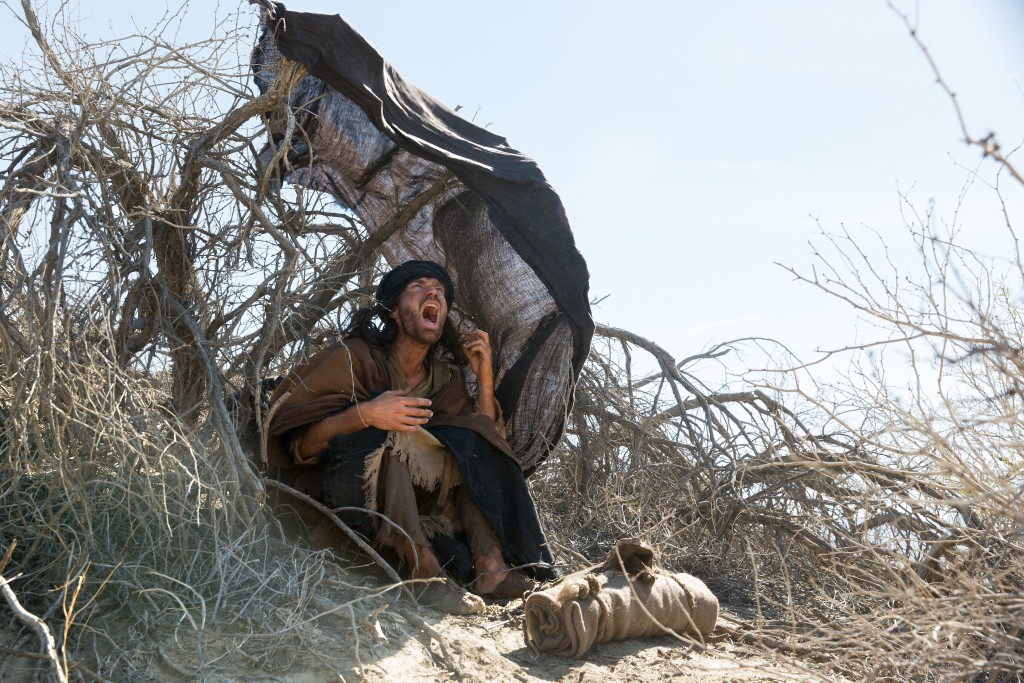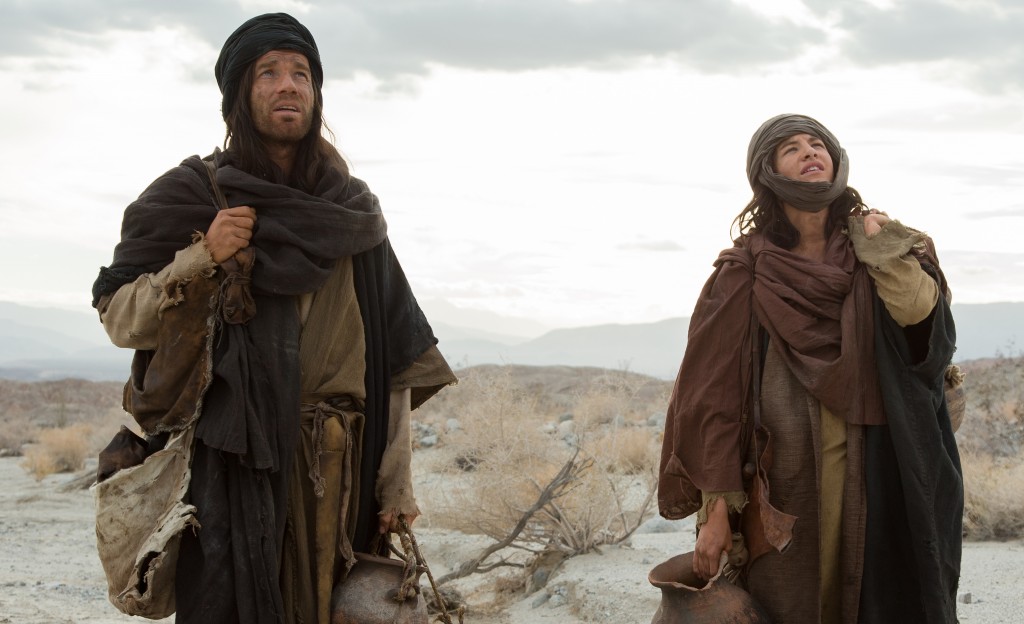What do you call the sufferings of a man who forces his family to live with him in a remote, desolate location because Jerusalem is corrupt?
“Just deserts.”
Okay, forgive me for that.
Last Days in the Desert, from director Rodrigo Garcia, brings a wandering, troubled, and all-caps HUMAN version of Jesus, played by Ewan McGregor, into contact with just such a fellow — a stubborn recluse (Ciarán Hinds) who wants his wife and son to remain with him in the middle of nowhere in order to escape the distractions of city life. Jesus, reluctant to keep company with the family, is ultimately drawn to the frustrations of a beleaguered and increasingly resentful son (Tye Sheridan of The Tree of Life and Mud), and camps out with this family to see what he can do about the boy’s angst and, eventually, the sufferings of a dying mother (Ayelet Zurer).

Directed with admirable patience, spaciousness, and contemplative inclinations by Garcia, and lensed by the masterful Emanuel Lubezki (The Revenant, The Tree of Life, Children of Men), Last Days in the Desert achieves something that very few Jesus films have achieved: Strangeness. That’s about the highest compliment that I can give this crew. They made a movie in which I wasn’t so distracted by the film’s faithfulness, or unfaithfulness, to the Scriptures because I was so captivated by the narrative’s unpredictability. I never knew what was coming next, and so my brain stayed busy throughout — a rare pleasure. When we finally arrive at images of the crucifixion, even those were unexpected.
What’s more — I rarely believe any movie about Jesus, even for a moment, because I rarely see a Jesus who might be something more human than a piece of stained glass. This Jesus is extremely physical, extremely accessible. It’s easy to relate to him. In fact, it’s so easy to relate to him that I think the Jesus Movie pendulum might be swinging too far to the opposite extreme — but I’ll get back to that later.

McGregor gives a surprisingly complicated performance as both Christ and “the Demon.” His Devil is wonderfully unstable — leering and sneering one minute, blinking blankly the next, and sometimes stumbling into moments of profound loneliness.
But the more we watch this Jesus’s angst, the more I begin to suspect that McGregor is struggling as much as I am to figure out what this script is really about. (The answers McGregor gives in the “special presentation’s” closing interview about his attempt to connect with something more… yeah, that’s how I felt too.) Even Lubezki seems unclear about what’s expected of him; his imagery is attractive but it rarely ever suggests anything. It’s like Garcia watched The Last Temptation of Christ, got excited about the early scenes in which Jesus seems rather lost and confused in a maze of his own “Daddy issues,” and decided to make a whole movie about that without any special insight.
The father/son themes are primal enough to resonate with some moviegoers, I’m sure. (And I like Stephen Holden‘s note: “Make what you will of the fact that Mr. García is the elder of two sons of a literary god, the Colombian author, Gabriel García Márquez.”)
But even though I appreciate ambiguity and spaciousness in art, I just never felt these plot points, conversations, or images achieving any kind of poetry. It’s so spacious, so spare, I imagine folks can, and will, imagine all kinds of things it might mean.
(Disclaimer: My suspension of disbelief and my ability to appreciate the film were dealt a profound blow by the “special presentation” introduction, in which two young men — who are apparently recognizable figures to consumers of Christian pop culture — gush superlatives for this film in a way that tells me they don’t watch that many art films. I immediately distrusted their judgment, and my feelings about having purchased a ticket worsened when I learned we’d have an unwanted and unremarkable praise song foisted upon us before the movie. By adding more, they made the experience of the movie something less.)
I might even have enjoyed the film more without Garcia’s last act jump to the crucifixion, which feels obligatory and uninspired. It distracted me, asking me to find some connection between what Garcia imagines might have occurred in the desert and what Jesus ends up willingly suffering. I wanted to gain some insight into how the film’s surprising central narrative informed Jesus’s subsequent ministry, but the film’s two jarring last-act leaps forward in time left me flailing for any rewarding interpretation.

Am I to conclude that since Jesus encouraged a troubled son to remain faithful to a difficult father that he was empowered to do so himself? Am I to assume that, watching a man risk his life to obtain something valuable for his family, Jesus found the will to put his own life on the line? Or is it that Jesus is so distraught by death’s hold on this poor family that he feels compelled to break the Devil’s power? Your guess is as good as mine.
Whatever the case, the film gives us no reason to believe that this Jesus is capable of anything miraculous at all. Sure, the Devil mocks him for holding back, but that’s not enough. McGregor’s Messiah is so human that he scolds himself for not having better advice for the struggling family, and exhorts himself with a variation on that famously fictional Francis of Assisi quote: “Preach the Gospel at all times and when necessary use words.” Any supernatural activity — levitation, for example — occurs only in Jesus’s dreams, unless you count his arguments with the Demon, who we’re led to believe might just be some kind of Fight Club alter ego, or an earthbound “shadow” to Jesus’s soaring bird.
Frankly, McGregor’s Jesus didn’t really have to be Jesus at all — he might have just been a “holy man.” Garcia seems to hold fast to that possibility as if to make sure not to alienate those in the audience who aren’t Christians. Jesus becomes an everyman: a guy just trying to figure out what a stubbornly silent God wants from him, and — get this — a fellow prone to falling for Satan’s simple tricks, like impersonating a dying woman and rasping deathbed lies about her husband’s unfaithfulness. (In one scene, Jesus actually asks the Devil to show him the boy’s future in something like the Mirror of Galadriel — and the scene feels an awful lot like Jesus succumbing to temptation and asking for the Devil’s help. Even stranger, we’re supposed to believe that the future the Devil shows Jesus is true.)
These fanciful departures from the familiar plot aren’t wrong for an artist to imagine — sometimes, distortions of convention result in surprisingly rewarding discoveries that help us see the familiar with new appreciation. (See The Last Temptation of Christ.) But they sure don’t align with anything in the gospels’ mentions of the young Jesus, who was so confident that he amazed people with his teachings in the temple. The farther Last Days goes, the less I find myself capable of imagining that this story is anything but Jesus Fan Fiction from a fan somewhat unfamiliar with the source material.
Oh, how I hate to share these misgivings about Last Days. I’d love nothing more than to see more challenging interpretations of the Gospel on the big screen than the “Christian movie industry” has provided so far. And this certainly qualifies. But the real challenge for any Jesus-movie filmmaker is in presenting a Christ who is both persuasively human and unnervingly divine. We’ve had far too many who adhere to the American Evangelical stereotype of the supremely confident, off-puttingly nice, white-skinned and blue-eyed magician Jesus — the one who grants wishes, and whose enemies make us think of supervillains instead of ourselves. We’ve had only a few striking depictions of God’s only son that show us a human being who wrestles with temptation and struggles to stay warm at night.
I’m hard-pressed to think of an actor who who strikes the right balance better than Willem Dafoe in The Last Temptation of Christ. It’s a flawed film, sure, but Dafoe’s version of the Christ occasionally, in his humanity and his strangeness, gives me that unsettling sense that, yes, Jesus must have been something like this. Even as evangelicals went into a panic about how Martin Scorsese’s controversial film “blasphemed” the Son of God, I quietly found my faith growing stronger as I watched it.
If Last Days strengthens my faith in anything, it’s in McGregor’s abilities as a leading man. His villain is an especially compelling creation, delightfully surprising in his complexity, startling in his humor, and recognizably human in his loneliness. Viewers might find him just pathetic enough to kindle some sympathy for the devil.
[This review is brought to you by the Looking Closer Specialists,
who have been generous enough to support my work
during a season when I’m short on time and resources.]